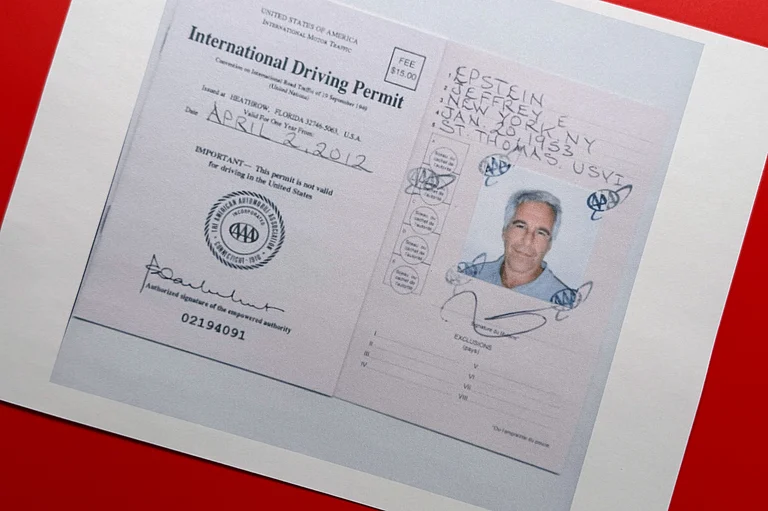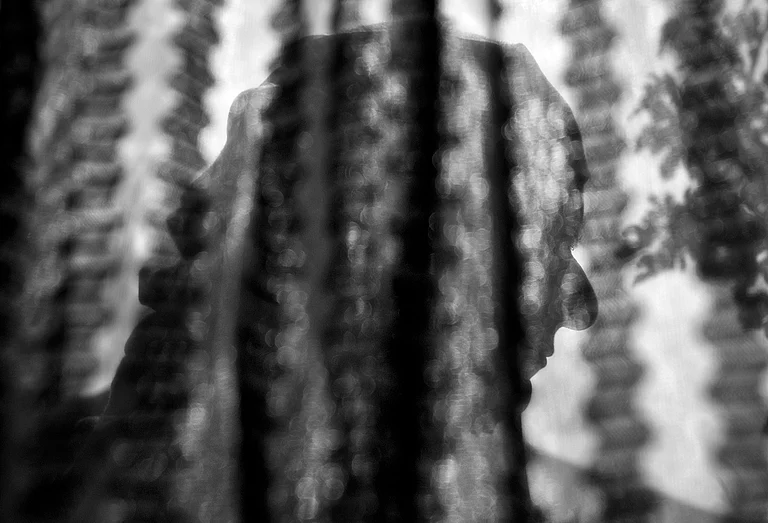A stretch of emerald lawn, peacocks dancing in the monsoon breeze, a bhajan wafting across from the family temple. Seen from an inner private verandah at Jaipur's City Palace, it's a scene that exudes peace and tranquility. In and around noisy Jaipur are other such oases, in palaces and stately homes left by Sawai Man Singh II, the last ruler of the princely state of Jaipur, to the heirs produced by his three wives. What he did not bequeath them, however, are peace and tranquility.
The former royal family's intense rivalries and decades-old battles for the control of real estate worth hundreds of crores of rupees got an energy boost last week, with a whirlwind visit by a petite Thai aristocrat from Bangkok accompanied by her children Lalitya, 27, and Devraj, 25. The message from Priyanandana Rangsit, ex-wife of Man Singh's youngest son, Jagat Singh, who drank himself to divorce, and a lonely death in a London house, was delivered in a blaze of publicity orchestrated by a PR company: wicked step-uncles are cheating her children of their inheritance.
Man Singh's third son, Prithvi Singh, assisted by his brother, Jai Singh (Pat and Joey to this dying world of Anglophile royals), are cast as villains in the tale told by the bitingly articulate Priyanandana. But there is a role, too, for Jagat's mother, Gayatri Devi, iconic face of princely India, beautiful even at 87. As Priyanandana and her children circulated copies of a newly publicised will they say is a forgery, Jaipur's Rajput elite speculated: did the imperious old lady really acquiesce in a move to disinherit her only two grandchildren from her own bloodline, even if she detests their mother?

Gayatri Devi, her husband Sawai Man Singh flanking Queen Elizabeth after a tiger shoot in Jaipur in 1961
The Thai branch's version of the scandal, told to Outlook over coffee at the City Palace, where they were staying as guests of Man Singh's eldest son, Bhawani Singh and his wife Padmini Devi (who are supporting them), is this: Priyanandana, descended from the kings of Siam, met Jagat while studying Sanskrit at London's School of Oriental and African Studies. She married him in England in 1978, her reception attended by Queen Elizabeth II and Lord Mountbatten. British public school-educated and horse-mad Priyanandana was in some ways a bride in the Jaipur mould, but her seven-year marriage was stormy. She separated from Jagat in 1985, taking custody of her children, but no money from Jagat's family "because I knew it would be difficult to get any". Relations between the estranged couple were bitter, the children not in touch with their father, principally, she says, because Jagat refused her a divorce, which took her seven years to get from the Thai courts. Priyanandana and her kids claim that in 1996, there was a patch-up. The children and Jagat spoke, but their plans to meet were derailed by his sudden death in February 1997.
After attending his funeral, Jagat's children began to form a relationship with grandmother Gayatri Devi, staying with her in Jaipur, and at her home in London. Since Jagat had died intestate, the two children, along with Gayatri Devi, jointly petitioned a local court claiming to be his three legal heirs, and Jagat's three half-brothers gave no-objection certificates. While awaiting a succession certificate, the minor children entrusted their affairs to Prithvi, who is Gayatri Devi's stepson and manager of the dowager's financial affairs, of Jagat's assets, and director of family companies. Eventually, however, Priyanandana and her children grew suspicious over extended delays in obtaining a succession certificate and transfer of assets, and problems in gaining information about their assets from 'Uncle Pat'.

The Jai Mahal Palace
So, they say, they began to dig last year, through the Registrar of Companies, focusing on one of Jagat's prominent assets, the Jai Mahal Palace, a 260-year-old, 100-room pile in the Rajput-Mughal style, spread over 18 acres in the heart of Jaipur, and leased to the Taj Group to run a hotel. Jagat, who had been gifted the palace by his father, held 99 per cent shares in Jai Mahal Palace Pvt Ltd that owned the palace, and Prithvi and his son, Vijit, 1 per cent. When Priyanandana learnt that Jagat's shareholding had been diluted to 7 per cent by the "illegal allotment" of 65,000 additional shares, and Prithvi and family now owned 93 per cent of the company, she had Devraj call his grandmother to protest.
"She (Gayatri Devi) told me my uncle would explain, but he never did," said Devraj, a soft-spoken youth in an Om tee-shirt, who speaks Hindi "thoda thoda". So, in April this year, the two children filed a petition against Prithvi and his son, directors of the company, at the Company Law Board (CLB) in Delhi. Then they came to know a will had been lodged in a Jaipur court in June, nine years after Jagat's death—a "Dear Mummy" letter written by Jagat, dated June 1996, disinheriting his children, and leaving everything to Gayatri Devi—and that the dowager had applied for succession as Jagat's sole heir, based on this will. That is when they deci-ded to launch their media offensive, they explain.
"The Rajmata has been manipulated, she is not infirm, but she is dependent, and easily influenced. When she is alone, she is one person, when she is with Patbapji and Joeybapji, she becomes another," charged Priyanandana. "I don't know what's in her mind...if she thinks this is my way of trying to grab Jagat's property, she should think again. My children are not minors, what comes to them is theirs. To cut them off like this is heartless."
Only after the three had left for Bangkok did Gayatri Devi's thin, bespectacled and reclusive stepson, Prithvi, break his silence—and his story is of course different. According to him, an associate of Jagat, R.C. Singh, who lives "somewhere Jodhpur side" had heard "through the grapevine" about demands on Jagat's assets, and had contacted Gayatri Devi earlier this year, and said, "I hope you know there is a will." It was then located among Jagat's papers. Gayatri Devi informed her grandchildren about its contents, he claims, and they reacted by going to the CLB.
"She said why not discuss it across the table, but they weren't interested in discussing it. If they had, it wouldn't have become a legal issue. This is uncalled for, the matter can be resolved.... The lady is 87, there is no dearth of wealth," Prithvi told Outlook in an interview at his office adjoining the Rambagh Palace.
Prithvi claims it was legitimate on his part to dilute Jagat's stake, to enable him to borrow from lending institutions to expand the company's activities. However, he says, money was not borrowed in the end, because the project for which it was to be taken fell through. (Priyanandana, however, claims Prithvi used full control over the company to get interest-free loans worth crores of rupees from the Taj group for the company.) "I bought the shares at par, at Rs 10 or Rs 100 per share, something like that. Anyone can buy me out," said Prithvi. "But now there is the controversy over the will...the matter is in the courts."
Finally, Prithvi produced a new piece of dirty royal linen: a yellowing fax message, apparently written by Priyanandana to Gayatri Devi in December 1996. The letter warns the dowager, in acerbic language, against "scheming again and planning to come to Bangkok after the New Year to surprise us and the children".
Jaipur will surely lap up these details. Bad blood between Priyanandana and her ex-mother-in-law, though, is Jaipur's worst-kept secret. It is hardly credible, argue Jagat's friends, who want to remain unnamed for fear of offending Gayatri Devi, that her only son would have disinherited his children. His purported letter is being picked apart in Jaipur's drawing rooms, with questions like: why was Jagat so sure he would be outlived by his mother? Why is it written on the letterhead of Rajmahal Palace, where he did not live then? Why would he pick such obscure witnesses? The R.C. Singh story is also being greeted with some scepticism.
In an interview to Outlook, Bhawani Singh's wife, Padmini Devi, 'Maharani of Jaipur' to courtiers, who has her own scores to settle with her step in-laws, raised some of those questions. Decorously draped in signature royal chiffon, but radiating fury at Prithvi, she said. "He did it to us, now he's doing it to these kids." Padmini said the claim that Jagat had disinherited his children because of his estrangement from them was unbelievable. "The Rajmata personally told my husband and myself that Jagat had started keeping in touch with the children before his death.... Maybe she is financially under the control of Maharaj Prithviraj Singh and has to keep him satisfied. More so than her own grandchildren."
Gayatri Devi is incommunicado, at one of London's most exclusive addresses, 61, Cadogan Square. Her innermost circle won't speak, beyond hinting the real story is yet to surface. Outside, voices of disapproval can be heard, and no one seems to mind Prithvi being cast in the role of villain. Opinion is divided over whether Gayatri Devi, who spends several months abroad every year, is fully conversant with the legal actions taken in her name. But there is sympathy for Jagat's children; the popular view is they must get their due.
The war of words continues. On August 2, Prithvi took out big ads in national and regional newspapers denouncing Priyanandana and her children's "mala fide intentions to grab property and defame Rajmata" and accused Bhawani of "provoking" them. For a city that has long fed on royal scandals and palace intrigues, from incest, adultery, drunken brawls and sibling rivalries to dark stories of murky financial dealings and family jewellery siphoned off abroad, this new round of hostilities, with promise of more to come, is adding its own flavour. To a broth spicier than a Thai curry.


























